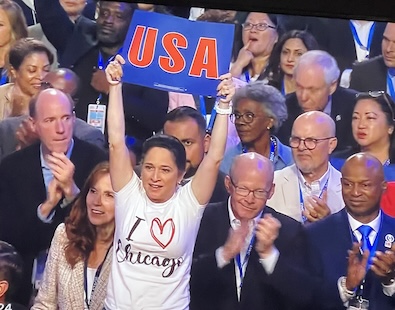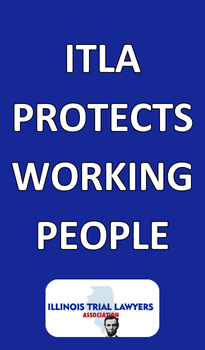|
Isabel’s afternoon roundup
Tuesday, Aug 20, 2024 - Posted by Isabel Miller * Governor JB Pritzker gets a prime time spot at the DNC…
* Tribune…
* Daily Herald | ‘Elections are now fought in the suburbs’: Illinois delegates hopeful for another historic win in November: DuPage County Board Chairman Deborah Conroy had one bit of advice for fellow delegates at the Democratic National Convention Tuesday morning. “Make sure you have good shoes on Nov. 5 because there will be glass everywhere,” Conroy said, referencing the glass ceiling she and other Democrats are hopeful will shatter with the election of the country’s first female president of color. * Sun-Times | CPD bracing for anti-war protest tonight: Chicago Police Supt. Larry Snelling said his officers are ready for a protest tonight that claims it will be “like ’68” — referring to the rioting in Chicago during the Democratic National Convention that year. The protest set for 7 p.m. outside the Consulate General of Israel to the Midwest at 500 W. Madison is not sanctioned by the city, but protesters say on social media that they plan to be there anyway.
* Block Club | Secret Service Looking Into Downtown Bomb Threats: The U.S. Secret service confirmed local law enforcement were investigating and were on-hand at the sites of the bomb threats. “The U.S. Secret Service is aware of threats made to various locations in the Downtown area. Law enforcement personnel are screening the affected areas and examining the credibility of the threat,” said a statement from the DNC 2024 Joint Information Center. * Crain’s | Throughout DNC, Dems play one of the strongest cards in their hand — abortion: Even ahead of the U.S. Supreme Court’s Dobbs v. Jackson Women’s Health Organization decision, which effectively overturned Roe v. Wade, Gov. J.B. Pritzker moved to enhance access and provide additional resources to abortion providers in the state, and he’s continued to do so since. Illinois Medicaid first began covering abortions in 2018. A year later, Pritzker signed the Illinois Reproductive Health Act, which made abortions a fundamental right in the state and required most private health insurance plans in Illinois to cover abortion as they do for any other pregnancy care. * Crain’s | Malort shots, sliders and skyline views: Inside the DNC party circuit: United Airlines opened the top floors of Willis Tower last night for an after-hours party for reporters and other guests in town for the Democratic National Convention. Among those who were spotted taking in 360-degree views of the city on a picture-perfect night — complete with a rare “super blue moon” — were Maureen Dowd and David Sanger of The New York Times, Jeff Zeleny and Kaitlan Collins of CNN, Philip Rucker of the Washington Post, NBC anchors Lester Holt and his son, Stefan Holt, and Jonathan Martin of Politico. * Sun-Times | Convention canines? Volunteer therapy dogs deployed to help ‘de-stress’ law enforcement during DNC duty: The therapy canines are not police dogs. They are trained to soothe people in crisis, specifically police officers and federal agents waiting to be deployed if any emergency occurs during the Democratic National Convention. “Preparing for the DNC in the advent of thousands of protesters has been a huge undertaking by a multitude of public safety agencies,” said retired police Sgt. Cindy Gross, a 30-year Chicago Police Department veteran who retired in 2001 after years of undercover work dealing with drugs, vice and prostitution. * NYT | A Look Back at Chicago Conventions of Yore: The city’s convention tradition dates back to the mid-1800s, and political parties visited regularly over the century that followed. But it has been an infrequent host since 1968, when clashes outside the convention hall marred the Democrats’ gathering that year. * Tribune | CPS touts progress as Chicago Teachers Union criticism mounts over bilingual education amid bargaining: With CTU members continuing to sharpen their criticism of CPS Chief Executive Officer Pedro Martinez, the news conference marks the latest salvo in a debate on whether a structural deficit exceeding $400 million in each of the next five school years should limit the district’s ability to fully staff and fund its programs. At Cooper Dual Language Academy, which received 130 migrant students last school year, union members came together to call on Martinez to “step up to the challenge of meeting our students’ needs, or to step aside,” said Walt Disney Magnet School music teacher Kathryn Zamarron. * Chicago Mag | Pay Now, Save Later: Budget whiz Ralph Martire has a plan to close Chicago’s $34 billion pension gap: It’s really not a pension crisis. It has nothing to do with the design of the pension systems themselves or the benefits offered. It is a debt service crisis. For generations, by statute, Chicago was allowed to underfund the pensions. That has created a huge amount of debt owed to the pension systems that compounds interest annually. The big jump in unfunded liability occurred between 2007 and 2020: $22.6 billion. Almost 60 percent of that growth was the statutory allowance for Chicago to underfund its pension. And the reason that legislative rubric was put in place was that the Daley administration wanted to provide services without necessarily paying for them with tax revenue. One way to do that is to defer your long-term obligations. That’s great for taxpayers in the years when you’re underfunding the pension. Not so great later, when you’ve got to make up the difference. * Sun-Times | Pace, CPS paratransit drivers end fourth day of strike without progress in contract negotiations: Nearly 800 drivers employed by SCR Medical Transportation walked out on strike Friday amid efforts to reach a labor contract with the company, said Teamsters Local 727, the union representing the drivers. SCR filed an injunction against Teamsters Local 727 on Monday morning. Union officials said the injunction was “meritless” and was an “attempt to infringe on the union members’ legal right to engage in lawful, peaceful picketing and hand-billing.” * Block Club | The Wild Mile Is Expanding Along Chicago River’s North Branch: Over the past few months, Urban Rivers — a nonprofit that works to transform city rivers into urban sanctuaries — and a team of volunteers have installed floating walkways and garden beds and hauled in over 30,000 pounds of rock aggregate to bring to life the second phase of the Wild Mile. […] The Wild Mile was created as part of a larger effort to redefine and rehabilitate the channelized section of the Chicago River. * Crain’s | Remembering Phil Donahue, a pioneer who elevated daytime TV: “The Phil Donahue Show” built its phenomenal nationally syndicated success as one of those rare places, one particularly appealing for housebound women paternal TV long underestimated as interested only in pap. Phil Donahue, who died Sunday at age 88, presided over what amounted to the People’s Press Conference five days a week from 1967 to 1996, its pre-eminence coinciding with the 11-year, 1974-85 stint in which his signature show was produced in Chicago. * Tribune | Chicago White Sox fail to take advantage of opportunities in 5-3 loss to fall 66 games under .500: At 30-96, the Sox are 66 games under .500 for the first time in franchise history. “We had good at-bats all night, put pressure on, getting guys on,” Sizemore said. “Just got to keep working, keep executing. Even though we got down, we kept fighting, kept clawing back. Getting some big hits late, pinch-hit hits. * Daily Southtown | Park Forest Mayor Joe Woods says he was attacked, seeks outside investigation: In a statement Saturday, Woods wrote he was the victim of a violent crime in which one of the assailants had a large knife in his hands, and Woods said at one point he was “knocked to the ground.” The altercation took place near a restaurant at which a garbage bin fire had just been extinguished. * WTTW | This New Lake County Conservation Preserve is for the Birds, and Only the Birds: The “conservation preserve” designation indicates the Forest Preserves will own and manage the site not for public access or even passive recreational use — which would damage the ecosystem and disrupt the rookery — but solely to ensure these “essential natural resources remain untouched and protected,” according to a statement from the Forest Preserves. * Crain’s | What the activist investor targeting Portillo’s wants management to fix: Engaged Capital wants Portillo’s to aggressively shrink the square footage of its new restaurants as it continues to expand. The brand’s longstanding Chicago-area spaces tend to be vast, some spanning two floors and up to 11,000 square feet, which is uncharacteristically large for a fast-casual chain. Portillo’s here can justify those large spaces because the margins in Chicago remain so strong. Nationally, though, Engaged thinks less is more. * Rockford Register Star | Microsoft proposes Cherry Valley data center on 300 acres: Microsoft unveiled the proposal on 309-acres of what is now agricultural land during an open house Monday at the Tebala Event Center, 7910 Newburg Road. The prospect of new high-paying jobs coming to the region attracted the attention of Dino Pandya, a Rockford resident who has one child who studying for a doctorate in physics at Princeton University and another who will soon graduate from Northwestern University with a master’s degree in computer science. * WCIA | U of I professors help usher in Illinois’ quantum age: University of Illinois Professor Brian DeMarco started studying the theoretical field of quantum computing back in the ’90s. Now, he helps make that theory a reality at the University of Illinois. “I just feel so fortunate to be at the have been in the lab at the beginning of it.” DeMarco said. “And now at this point where the state has made this investment to try to build the big one and do it first.” * The Southern | Historical society to host talk on Illinois’ role in the Civil War: The Jefferson County Historical Society will present ‘Illinois in the Inevitable: the Role of Illinois in the Civil War’ 2 p.m. Aug. 24 in the Schweinfurth Museum at the Historical Village. […] Illinois was a microcosm of the United States during its Antebellum Era, according to a JCHS news release. Northern Illinois and Chicago had ties to the Northeast and industry, while the southern portion remained firmly agricultural with the Underground Railroad in southwestern Illinois and salt mines and slave catchers in southeastern Illinois. * AP | Tens of thousands remain without power in Puerto Rico, a week after tropical storm swiped the island: The National Weather Service issued yet another excessive heat advisory, warning of “dangerously hot and humid conditions.” More than 40,000 out of nearly 1.5 million customers remained without power in the afternoon. All schools should have electricity by late Tuesday, officials said, and noted that some 80% of emergency medical clinics, which exclude hospitals, have power.
|
|
Stellantis confirms Belvidere plant reopening is delayed, but stands by commitment to reopen
Tuesday, Aug 20, 2024 - Posted by Rich Miller
|
|
Isabel’s DNC news coverage roundup
Tuesday, Aug 20, 2024 - Posted by Isabel Miller * Tribune…
* WaPo…
* Sun-Times…
* Tribune…
* Stephen Colbert’s Chicago anthem… * More… * AP | It’s Been 20 Years Since Barack Obama Made His DNC Debut. He’s Back to Make the Case for Kamala Harris: “President Obama is still a north star in the party,” said Illinois Lt. Gov. Juliana Stratton, who credits the 44th president with helping her become her state’s first Black woman lieutenant governor. Besides Harris herself on Thursday, Stratton said, no voice this week is more integral to stirring Democrats, reaching independents and cajoling moderate Republicans than Obama. * Axios | DNC makes Teamsters president sweat: Teamsters President Sean O’Brien has been ghosted by the Democratic National Convention after his request to speak this week in Chicago. […] The Teamsters boss became the first-ever union president to speak at an RNC last month, delivering fiery remarks before a party that has a track record of opposing labor movements.
* Tribune | Steve Kerr returns to the United Center for his DNC speech: ‘I believe leaders should tell the truth’: Former Chicago Bulls star and current Golden State Warriors coach Steve Kerr endorsed Vice President Kamala Harris and her running mate, Gov. Tim Walz, in a speech at the Democratic National Convention in Chicago on Monday. “I know very well that speaking out about politics these days comes with risk,” Kerr said. “I can see the ‘shut up and whistle’ tweets being fired out as we speak. But I also knew as soon as I was asked that it was too important as an American citizen not to speak up in an election of this magnitude.” * Block Club | DNC Celebrity Tracker: Here Are The Famous People At The Convention And Around Chicago This Week: Ana Navarro, a Nicaraguan American political strategist and commentator, will host Tuesday night. While Navarro has said she is Republican, she has long criticized Republican presidential nominee and former president Donald Trump, and she often lends support to Democrat politicians. * Tribune | After RV tour championing Democrats, Gen Z activists bring DNC to peers: Sam Schwartz just finished caravaning around the country in an RV for 28 days with half a dozen fellow Gen Z activists. The 20-year-old gun reform activist stopped in 15 districts across 11 states on a mission to get Democrats elected to Congress. On Sunday, he boarded a plane from Palm Beach, Florida, to Chicago to attend the Democratic National Convention with two of his traveling companions: his girlfriend, Emma Levine, 20, and Highland Park shooting survivor Drew Spiegel, 19. * Crain’s | Playing host or progressive preacher? As DNC kicks off, Johnson tries a bit of both: Johnson’s schedule this week includes events where organizers will push for more federal funding for education, discuss Chicago’s potential investment in a municipally-run grocery store and tout Johnson’s early legislative win on gradually eliminating the sub-minimum wage for tipped workers. The week represents an opportunity for Johnson to prove Chicago’s national image is ready for a makeover and to potentially pump life into what’s expected to be his contentious bid for a second term by showing progressives they were right to spend the energy and resources to elect him. * NYT | Highlights From Night 1 of the Democratic Convention: In a city where he was supposed to claim the mantle of the Democratic Party for the final time, at a convention where he was supposed to cement his political legacy, President Biden instead passed the torch of leadership, wiping away tears as the crowd rose to its feet in a sustained ovation and chanted, “Thank you, Joe.” The outpouring of gratitude for his decision to step aside and make way for Vice President Kamala Harris seemed to encourage Mr. Biden as he claimed credit for saving democracy, and for much more, in a nearly hourlong speech filled with optimism and a fighting spirit that capped the first night of the Democratic National Convention in Chicago. * Sun-Times | From high school football coach to VP candidate: How to tackle all this, Coach Walz?: Anyway, Tim, you were the defensive coordinator for Mankato West High School when it won the Minnesota 4A state championship 25 years ago. Here’s what Lance Resner, a linebacker on that Scarlets team, told the New York Times about how you fired guys up: “Tim came in with a different swagger. We were pretty dog [crap] for a long time.” So what would you do to stop Caleb Williams and the Bears, a team full of expectations but also coming off a pretty dog-poop past?
|
|
The IL GOP’s take
Tuesday, Aug 20, 2024 - Posted by Rich Miller * Illinois GOP Chair Kathy Salvi…
Discuss.
|
|
‘Being the biggest crime of the last fifty years, and everybody wanted to get in the newspaper story about it’ (Updated)
Tuesday, Aug 20, 2024 - Posted by Rich Miller * It looks like the protest organizers did their part to keep the peace yesterday. From the Sun-Times, which had seven (7!) reporters assigned to yesterday’s protest…
* CBS News…
* Check out this video clip from NBC5 of the police push-back. It’s mostly reporters in front of the cops… Another angle from Fox 32…  * The Tribune assigned four reporters…
* AP…
* I posted this yesterday, but one of the defining moments of yesterday’s protest was when the marchers had to pause so they could ask reporters to please get the heck out of their way…
* I wonder who got that fence contract…
* All that being said, this is next…
* More…
* As the DNC in Chicago again sees large protests, a new generation of demonstrators finds inspiration in the past: Michael James, now 82 years old, recalled the police crackdown on those protests, telling CBS News, “It was basically an attack.” James can be seen in a famous photograph of protesters surrounding a police van. * Fox News: Chicago DNC protests to put Illinois’ no-cash-bail law to the ultimate test [Headline explained here.] …Adding… Hope nobody is disappointed…
|
|
President Harmon on staff union legislation: House leadership and staff should “get together and solve their own problems” (Updated)
Tuesday, Aug 20, 2024 - Posted by Isabel Miller * As we discussed, House Speaker Chris Welch was asked yesterday how the Illinois Legislative Staff Association’s lawsuit affects his message on workers’ rights. A reporter asked Senate President Don Harmon this morning why his chamber hasn’t moved a bill that would allow staff to unionize…
Thoughts? [Full video is here.] …Adding… ILSA’s response…
|
|
Showcasing The Retailers Who Make Illinois Work
Tuesday, Aug 20, 2024 - Posted by Advertising Department [The following is a paid advertisement.] Retail provides one out of every five Illinois jobs, generates the second largest amount of tax revenue for the state, and is the largest source of revenue for local governments. But retail is also so much more, with retailers serving as the trusted contributors to life’s moments, big and small. We Are Retail and IRMA are dedicated to sharing the stories of retailers like the Ervins, who serve their communities with dedication and pride.
|
|
IPI commisioned poll has more bad news for Mayor Johnson
Tuesday, Aug 20, 2024 - Posted by Rich Miller * M3 Strategies is a Republican pollster which did work for Paul Vallas last year, and this particular poll was conducted for the Illinois Policy Institute. However, their polling in the first round of the mayor’s race was dead-on. The results are also about three weeks old. I could go on, but take it for what it’s worth…
Crosstabs are here.
|
|
Uber Partners With Cities To Expand Urban Transportation
Tuesday, Aug 20, 2024 - Posted by Advertising Department [The following is a paid advertisement.] Uber is leading the charge to close critical transportation gaps, ensuring reliable access to its services in places that need it most, such as underserved areas like Englewood. This is a part of Uber’s broader commitment to augment and expand the reach of Chicago’s transportation ecosystem, focusing on overcoming the first-mile/ last-mile hurdles that have long plagued residents in farther afield neighborhoods. Uber aims to extend the public transit network’s reach, making urban transportation more accessible and efficient for everyone. Discover the full story on how Uber is transforming city transportation for the better.
|
|
Caption contest!
Tuesday, Aug 20, 2024 - Posted by Rich Miller * From last night… 
|
|
Open thread
Tuesday, Aug 20, 2024 - Posted by Isabel Miller * What’s going on in your part of Illinois?…
|
|
Isabel’s morning briefing
Tuesday, Aug 20, 2024 - Posted by Isabel Miller * ICYMI: It’s day two of the DNC… * Capitol News Illinois | As DNC opens in Chicago, state leaders tout Illinois as a ‘model of Democratic success’: But instead of focusing on Trump and other Republicans on Monday, Democrats tried to keep the spotlight on their positive vision for what their party can accomplish. “This convention is our opportunity to share our successes, to set the agenda, and to show the entire country why Illinois is leading the way,” DNC Host Committee Executive Director Christy George, who most recently worked in Pritzker’s office on budget and economic issues, told the breakfast crowd. * Tribune | DNC in Chicago: What happened Monday — and what’s coming Tuesday: * Block Club | DNC Speaker Schedule By Day: The main programming runs from 6 p.m. to 10 p.m. each night. Here’s the expected rundown of the DNC 2024 speaker schedule for the United Center with the associated themes for the day, according to CNN and Axios. * Daily Herald | Walz makes surprise appearance at Duckworth, Krishnamoorthi event: Northwest suburban Democratic U.S. Rep. Raja Krishnamoorthi was to be the keynote speaker Monday at a meeting of the Asian American and Pacific Islander caucus, but no wonder he began his remarks saying he would observe three rules of public speaking: “be short, be sweet and be gone.” That’s because Minnesota Gov. Tim Walz — Vice President Kamala Harris’ running mate — was waiting in the wings. * Daily Herald | No ‘cool kids’ table at Illinois delegation’s opening breakfast: Instead of one table for congressional hotshots, one for state politicos and another for grass-roots volunteers, Democrats mixed it up over pancakes at the Illinois delegation’s first breakfast meeting. Democratic National Convention delegates Mark Guethle and Beth Penesis of Kane County shared a table Monday with U.S. Reps. Sean Casten, Bill Foster and Lauren Underwood, state Sens. Laura Murphy and Laura Fine, DuPage County Chair Deb Conroy and others. U.S. Sen. Tammy Duckworth also paused to chat, as did Sen. Dick Durbin. * Sun-Times | Wrought-iron fence closes off site of former homeless encampment cleared before the DNC: What a permanent solution will look like for its former residents isn’t yet clear. “My whole thing with the DNC, it seemed like they were going to give us a vacation from being homeless,” said the neighbor known as “Six-Nine” who now lives at 16th and Union where he feels “safe” and “peaceful.” “When Tremont closes, the people are going to come back to where they know.” * Sun-Times | Biden takes stage at Chicago DNC. ‘Democracy must be preserved.’: “America’s best days are not behind us. They’re before us,” Biden said in a late-night farewell speech capping an evening of delayed programming that bumped him from primetime television. “With a grateful heart, I stand before you now on this August night, to report that democracy has prevailed, Biden said. “Democracy has prevailed. Democracy has delivered. And now, democracy must be preserved.” * Tribune | Planned Parenthood offers free abortions and vasectomies at mobile clinic near DNC to ‘show what is possible’: A few blocks from the Democratic National Convention, Planned Parenthood is offering free medication abortions and vasectomies at its mobile health clinic to demonstrate “what is possible when policies truly support accessible reproductive health care,” according to the agency. Physicians were providing abortions and vasectomies by appointment on Monday in the West Loop and said they planned to continue doing so Tuesday. As of Monday evening, no appointments on Tuesday were available. The Chicago Abortion Fund has also been distributing free emergency contraceptive at the site. * Tribune | Urban historian Shermann ‘Dilla’ Thomas showcases Chicago’s South and West sides during DNC: As he led the tour, Thomas said that he didn’t limit himself to only describing the legendary skyscrapers of the Loop visible during the river cruise. He also talked about the neighborhoods that the DNC organizers weren’t seeing. “I made clear to them that if Chicago is chosen, they need to also make sure that they include Chicago neighborhoods (to the south of) Cermak,” Thomas said, referring to the street that runs along McCormick Place, the daytime venue of the convention. “So once Chicago got chosen, I guess they remembered me.” * Tribune | Gov JB Pritzker’s national moment has come at the DNC. But it’s much different than first imagined.: Even as he ponders what’s next, Pritzker, not even halfway through his second term, is relishing the role of dutiful host, booking John Legend to play an after-party at the Salt Shed following the governor’s speech and ordering up specially branded JBeer from a pair of local breweries to serve to guests. During the summer’s tumult, Pritzker, a Biden campaign co-chair, displayed the patience and party loyalty that have been hallmarks of his political career. * Gov. Pritzker hits the bars during ‘Daily Show’ episode taping in Chicago: With the Democratic National Convention barely begun, the “Daily Show” mostly skipped the United Center politicking in the first of its four Chicago-based episodes. The focus instead was the host city, ribbed by a procession of jokesters who included Gov. JB Pritzker. In a taped segment, the governor smoothly parried tough questions (“Is ‘The Bear’ a comedy or a drama?”) from Jordan Klepper as the “Daily Show” regular (and former Chicagoan) kept diverting their tour of Wrigleyville into his favorite watering holes. * Here are the speakers for today’s Illinois delegate breakfast…
* Block Club | Judge Upholds Decision To Block Metal Scrapper Southside Recycling From Opening: A Cook County judge on Friday reversed a lower court’s ruling that the proposed metal scrapper — which would take on troubled North Side scrapper General Iron’s assets — should have been permitted to open. * Block Club | Chicago River Swim Moving To Lake Michigan After City Blocked Permit: Organizers of the Sept. 22 swim previously planned to host the 2-mile event in the Chicago River, which would have made it the first open-water swim in the river in nearly a century. The city denied that request due to health concerns. To keep true to the original plans and the event’s name, organizers now plan to start the swim by picking up participants along the riverwalk and transporting them to Ohio Street Beach, 600 N. Lake Shore Drive, by boat, according to a Monday news release. * Daily Herald | As national stature rises, Irvin will seek third term as Aurora’s mayor: Richard Irvin made it official this week, announcing he is seeking a third term as the top elected official of the state’s second-largest city. With four current aldermen flanking him on stage, Irvin said that under his leadership, Aurora has improved economically and gained stature, locally, statewide and across the nation. * Daily Herald | Another truck wedged under Long Grove bridge Monday morning: “The vast majority of the times this happens, it damages the vehicle,” Long Grove Assistant Village Manager Dana McCarthy said. “The bridge is made of heavy duty steel.” After the collision at about 7 a.m., it was more a case of deflating the truck’s tires to free it and get it on its way than addressing any structural damage, he added. * Daily Herald | Colbert shouts out Mount Prospect music fest, among other ‘community calendar’ listings in the suburbs: In a bit that aired on his CBS Late Show last Thursday, the Second City alum and Northwestern University grad was joined on set by actor Sean Hayes for “Chicago’s Community Calendar, your source for what’s going on in Chicago and the greater Chicagoland area.” That included shout-outs to the 56 Music Fix festival in Mount Prospect featuring local bands like Uncle Pigeon, Booti Grooviani, and Day Drinkerz, “who take the stage at 5 p.m., unless they’ve already blacked out,” Colbert quipped. * PJ Star | Ryan Spain responds to WTVP donation being linked to him in Peoria police report: State Rep. Ryan Spain, R-Peoria, had no knowledge that money improperly donated to his campaign came from the coffers of WTVP-TV, according to a statement from his campaign. Spain’s name was mentioned in a report written by the Peoria Police Department detailing how former WTVP CEO Lesley Matuszak used money from the public television station as her own personal piggy bank, buying luxury goods, vacations, expensive dinners and even making political donations. Matuszak used roughly $7,000 of WTVP’s money to make political donations to Spain’s campaign fund, according to the police report. Non-profits like WTVP are not allowed to make campaign contributions to political candidates under federal tax code. * CNI | In Cairo, massive 3D printer provides affordable housing hope: Hundreds gathered in Illinois’ southernmost city on Saturday to witness a demonstration of the futuristic printer, with American flags waving from the top of its two tall legs. 3D printing is emerging as a promising technology that could accelerate affordable housing development nationwide. The machine, the first of its kind in the region, is owned by Eminence Resource Inc., based in Harrisburg, 80 miles north of Cairo. The company is donating the duplex to the city. * SJ-R | Coroner will serve as sheriff in temporary role following Campbell’s retirement: Sangamon County Coroner Jim Allmon will serve as sheriff in a temporary capacity it was announced by the county Monday. Meanwhile, a committee will review applications and participate in the interview and nomination process for the candidate who will succeed Sheriff Jack Campbell, who is retiring no later than Aug. 31 in wake of the fatal shooting of Sonya Massey by a deputy on July 6.
|
|
Protected: SUBSCRIBERS ONLY - Today’s edition of Capitol Fax (use all CAPS in password)
Tuesday, Aug 20, 2024 - Posted by Rich Miller
|
|
Live coverage
Tuesday, Aug 20, 2024 - Posted by Isabel Miller * You can click here or here to follow breaking news. It’s the best we can do unless or until Twitter gets its act together.
|
|
Selected press releases (Live updates)
Tuesday, Aug 20, 2024 - Posted by Isabel Miller
|
| « NEWER POSTS | PREVIOUS POSTS » |















